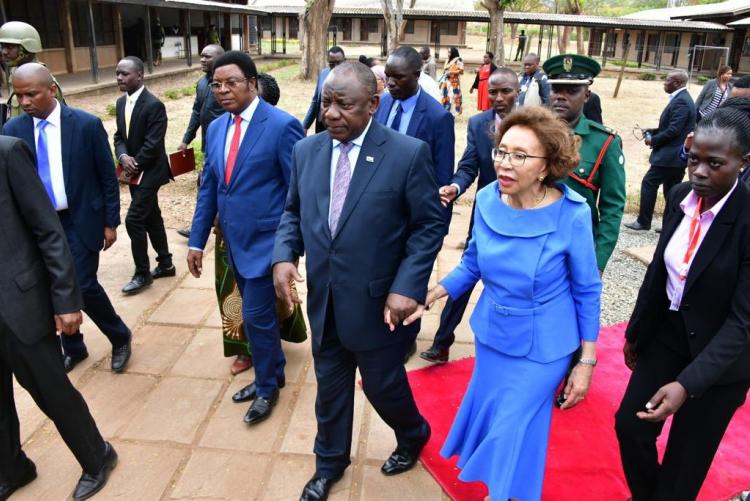Every day, the Correspondents’ Club describes how the same news item is illustrated in two countries.
This year should mark the return of a relaxed relationship between South Africa and Russia. Pretoria refuses to condemn the Russian invasion of Ukraine and continues to maintain good relations with Moscow. Vladimir Putin could be present in South Africa in August for the BRICS summit (Brazil, India, China, South Africa). This invitation has been controversial since the head of the Kremlin is the target of an international arrest warrant. At the same time, if Brazil has so far adopted a neutral position in the conflict between Russia and Ukraine, the election of Lula seems to change the situation somewhat.
Intense political exchanges between Russia and South Africa
Observers in the country are wondering whether Vladimir Putin will dare to come to Pretoria in August for the BRICS summit and whether the South African government will ignore the International Criminal Court by receiving a man suspected of war crimes. South Africa, which claims to be neutral in the Ukrainian conflict, would undoubtedly fall into the pro-Russian camp.
For South African journalist Peter Fabricius, a specialist in international relations, Western countries could see red: “We are seeing a slow deterioration in relations with the European Union. They are not atrocious, but it seems that the United States and the European Union are becoming less and less tolerant. Welcoming Vladimir Putin to South Africa would certainly be very badly perceived by them.”
The BRICS summit in August is likely to be a very anti-Western event, worries The Sunday Times. In its editorial last week, the newspaper expressed fears that the BRICS summit could turn into an anti-Western extravaganza, even though the European Union and the United States are major trading partners. South Africa dreams of a strong BRICS group that would counterbalance US domination and especially its currency, the dollar. The creation of a common BRICS currency is to be discussed in August.
If Vladimir Putin does not come to South Africa, the South African government will come to him. Political exchanges between the two countries are intense. At the end of March, a group of MPs from the ruling ANC party were in Moscow. “We will continue to support the Russian people,” said the Speaker of the National Assembly. Before the BRICS, there were
If Vladimir Putin does not come to South Africa, the South African government will go to him. There are intense political exchanges between the two countries. At the end of March, a group of MPs from the ruling ANC party were in Moscow. “We will continue to support the Russian people,” said the Speaker of the National Assembly. Before the BRICS, there will be the Russia-Africa summit in St Petersburg in July. This is another opportunity to show the rest of the world that Russia is a powerful ally for South Africa and not a pest.
Lula defends the creation of a “peace club”, outside the West
Since the beginning of the conflict, Brazil has not been among the countries applying sanctions against Vladimir Putin. Russia is a major trading partner of Brazil, supplying fertilisers for the Brazilian agribusiness, and trade relations between the two countries have been maintained despite the war. But since coming to power earlier this year, President Lula has spoken out against the conflict, going so far as to say that Russia made a “historic mistake” by invading Ukraine. In January, however, Lula vetoed a German request to send arms to Ukraine.
Although the Brazilian president did not attend the “Democracy Summit”, organised by Joe Biden, Lula dreams of being a mediator in the peace negotiations between Ukraine and Russia. He advocates the creation of a “peace club”, outside the West, including countries such as China, India and Indonesia. A way for Brazil to re-enter the international political scene, after the isolation during the Bolsonaro government.
Brazil: President Lula sees himself as a mediator in the war peace process in Ukraine
Lula will make his first official trip to China this month, and the two leaders are expected to discuss the war in Ukraine. It is an important trip for trade relations between the two countries, but also for Brazilian diplomacy, which wants to see a renaissance of the BRICS. Former president Dilma Roussef took over the presidency of the BRICS bank in March.
The Brazilian president is in a difficult position to maintain neutrality in the war in Ukraine. Even if China does not supply arms to Russia, the two leaders are close. Xi Jinping, who visited Moscow a fortnight ago, has again positioned himself as a mediator in the conflict. But the Beijing-led peace talks could favour Russia and threaten Brazilian neutrality. In February, at the UN General Assembly, Brazil was the only BRICS country to vote for the withdrawal of Russian troops from Ukraine. In the potential “peace club” desired by Lula, different visions of this conflict resolution coexist.



